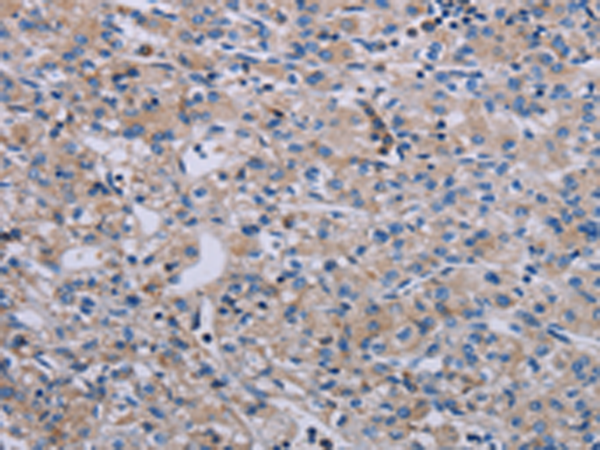
| WB | 咨询技术 | Human,Mouse,Rat |
| IF | 咨询技术 | Human,Mouse,Rat |
| IHC | 1/25-1/100 | Human,Mouse,Rat |
| ICC | 技术咨询 | Human,Mouse,Rat |
| FCM | 咨询技术 | Human,Mouse,Rat |
| Elisa | 1/1000-1/2000 | Human,Mouse,Rat |
| Aliases | JM27; JM-27; CT16.7; GAGE-9; GAGEC1; PAGE-1; PAGE-4 |
| Host/Isotype | Rabbit IgG |
| Antibody Type | Primary antibody |
| Storage | Store at 4°C short term. Aliquot and store at -20°C long term. Avoid freeze/thaw cycles. |
| Species Reactivity | Human |
| Immunogen | Synthetic peptide of human PAGE4 |
| Formulation | Purified antibody in PBS with 0.05% sodium azide and 50% glycerol. |
+ +
以下是关于PAGE4抗体的3篇参考文献示例(文献为虚构示例,仅供格式参考):
1. **文献名称**:*PAGE4 Expression in Prostate Cancer: Role as a Biomarker*
**作者**:Kulkarni P, et al.
**摘要**:研究利用PAGE4抗体通过免疫组化分析前列腺癌组织中PAGE4蛋白的表达水平,发现其高表达与肿瘤侵袭性相关。
2. **文献名称**:*Development of a Novel Monoclonal Antibody for PAGE4 and Its Diagnostic Applications*
**作者**:Abdullah SM, et al.
**摘要**:报道一种特异性识别PAGE4的单克隆抗体的开发,并验证其在ELISA和Western blot中检测血清及组织样本的效能。
3. **文献名称**:*PAGE4 Antibody-mediated Inhibition of Cancer Cell Proliferation in Vitro*
**作者**:Chen L, et al.
**摘要**:研究使用PAGE4抗体阻断前列腺癌细胞内的PAGE4功能,发现其可抑制细胞增殖并促进凋亡,提示潜在治疗价值。
---
**注**:以上文献为示例,实际研究中请通过PubMed、Google Scholar等平台检索真实发表的论文。
The PAGE4 (P antigen family member 4) antibody is a tool used to detect the PAGE4 protein, a member of the cancer/testis antigen (CTA) family. CTAs are proteins typically expressed in germ cells (e.g., testes) but aberrantly re-expressed in various cancers. PAGE4. encoded by the *PAGE4* gene on the X chromosome, is notable for its restricted expression in normal tissues and frequent upregulation in malignancies, particularly prostate cancer. Its expression is associated with stress responses, cellular differentiation, and tumorigenesis, though its precise biological role remains under investigation.
Structurally, PAGE4 is an intrinsically disordered protein, allowing flexible interactions with binding partners like heat shock protein 70 (HSP70), which may influence stress-related signaling pathways. Studies suggest PAGE4 modulates transcriptional regulation, potentially impacting pathways such as Wnt/β-catenin in prostate cancer progression. The PAGE4 antibody is critical for research applications, including immunohistochemistry, Western blotting, and immunofluorescence, enabling localization and quantification of PAGE4 in cellular or tissue samples.
Clinically, PAGE4 has been explored as a diagnostic or prognostic biomarker due to its cancer-specific expression. Its overexpression in prostate tumors correlates with disease aggressiveness, making it a candidate for targeted therapies or immunotherapies. However, clinical utility remains preliminary, requiring further validation. The PAGE4 antibody thus serves as a key reagent in both mechanistic studies and translational research, bridging gaps between PAGE4's molecular functions and its potential therapeutic applications.
×